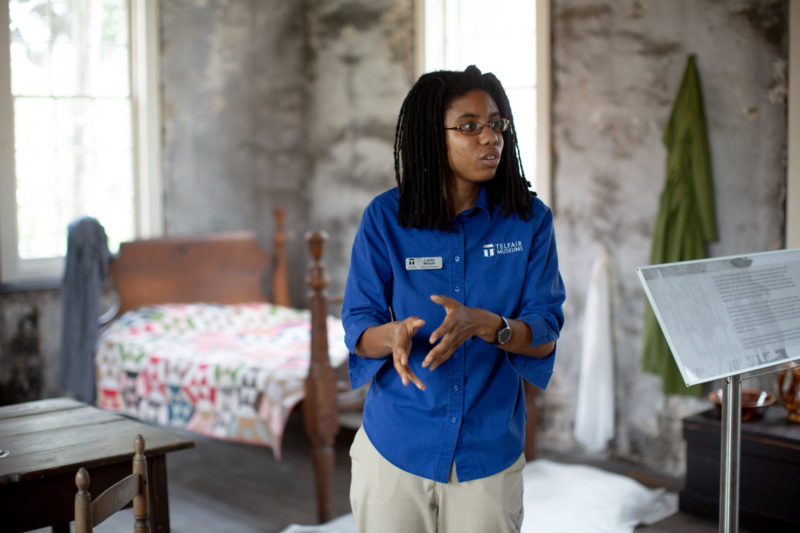How we grow: Engaging students, developing community
15 August 2019 – Lacey Wilson
Editor’s Note: This post is part of a series that illustrates the role of the NCPH Endowment in supporting and growing the field. To find out more about how the NCPH Endowment Fund supports the work of public historians and to make your pledge to the 2020 Vision campaign, please visit: https://ncph.org/giving/endowment/.
In this post, Lacey Wilson considers how NCPH has supported her work as an emerging public historian by providing an inviting space to connect with others over shared values and ideas about inclusion, community engagement, and education. For Lacey, the Endowment Fund matters because it provides vital resources to support the development of students and new professionals.

Lacey Wilson discussing interpretation and her experiences at the Owens-Thomas House & Slave Quarters in Savannah, Georgia. Photo credit: Hunter McRae of The New York Times
Why are you a member of NCPH?
When I was in undergrad at the University of Maryland, Baltimore County just getting interested in public history, all of the public history graduate students who I knew and admired were going to the NCPH Annual Meeting in Ottawa. They all came back with stories, and that was my first hint that this organization was important. I made my way to Nashville Annual Meeting the next year, after I graduated with my bachelors, and I was blown away by the level of participation I was able to have as a new member, recently graduated UMBC alum, and late adopter of Twitter. It was friendly, inspiring, and overwhelmingly inviting. I met so many academics, graduate students, professors, and independents who were excited to talk about everything related to public history.
Joining NCPH and going to the annual conference made me the public historian I am today. This organization is where I realized how many historians like me value their connection to their communities, see education as something that happens with visitors, and view inclusion in the field as a necessity. I commiserated with students at all levels about unpaid internships and volunteer opportunities and then watched as NCPH revised their jobs page to give job seekers more information about employment opportunities. I watched peers gain opportunities on committees and then turn around and encourage me to join them. Now, as a member of the NCPH Advocacy Committee, I am excited to be a part of the process of speaking out for our members.
How has the NCPH Endowment Fund helped you in your work as a public historian?
The first two times I went out of state to NCPH, I received financial support from the organization’s Endowment Fund to offset some of my conference costs. This was part of an effort to offset costs to create more inclusion for an organization that doesn’t represent the vast world of public history. Using these funds I was able to travel to Nashville and Indianapolis, participating in annual conferences both before and during graduate school.
I cannot overstate how NCPH has given me the confidence to network. While I was in graduate school peers of mine commented on my ability to talk to people in a professional setting, and I do credit a lot of that to the friendliness of attending NCPH. The friendliness of NCPH and the opportunities created in NCPH programming, through the support of the Endowment, are such that as a student I felt completely comfortable talking to anyone at the conference.
It is also important to recognize that the NCPH Endowment Fund pays for our NCPH support staff, without whom the conference would not come together. I have volunteered for NCPH twice, and on both occasions, I gained such respect for Stephanie Rowe, Christine Crosby, and Meghan Hillman. They really can’t be thanked enough for being organized during the passionate meeting that is our annual conference.
In what ways would you like to see NCPH further support public historians?
In Hartford I saw so many graduate students presenting, and in Baltimore—essentially my home base—I watched community groups present fascinating work. What I’d like to see is a strong continuation of engagement with students and community groups. I’d like to see returning students like myself get more and more involved in the organization on a variety of levels. When marketing the opportunity to join an NCPH committee on Twitter, I was asked whether graduate students should join. I responded that more student involvement in NCPH is always a good thing, and I stand by that. The growth in the field truly comes from students becoming more involved by presenting, participating in workshops, and engaging on social media. With community groups, I’d like to see more of a sense of ownership and continued involvement in the organization. I’ve seen community groups come and go, and I wonder what can we do to be more welcoming as an organization for community groups to stay involved.
~ Lacey Wilson is Public Historian and Historic Interpreter at the Owens-Thomas House and Slave Quarters. She is a member of the NCPH’s Advocacy Committee and the Black Interpreter’s Guild.



